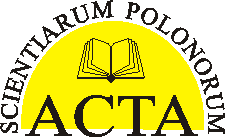Title
INFLUENCE OF SOWING PERIOD AND FERTILIZATION ON YIELD AND QUALITY OF SEEDS OF Nigella damascena AND Nigella sativa
Autor
Dijana Horvat, Marija Vukobratović, Krunoslav Karalić, Vesna Židovec
Keywords
agrotechnics, germination capacity, germination energy, medicinal plants, ornamental plants
Abstract
Background. Representatives of the Nigella genus are annual plants with a short vegetation period. The best known species are Nigella damascena and Nigella sativa. N. damascena is a traditional flower species in Croatian flora that is in increasing demand due to its modest agrotechnical demands and its variety of use for ornamental purposes. N. sativa has become well known over the past several years for its oil, which is used for medicinal purposes. The increasing demand for its oil is met through import or by the processing of imported “raw material”. Both species have a high cultivation potential and the possibility of usage in the pharmaceutical industry and horticulture, but the problem is lack of seed. The objective of this research was to determine achieved yields and seed quality (1000 seed weight, energy, germination and health condition) in two sowing periods with the application of fertilizer. Material and methods. The field trial was set up in a random block design in four repetitions over two years. The first factor in the trial was the sowing period (spring, autumn), the second factor was fertilization (no fertilizer, nitrogen 30 kg· ha-1, phosphorus 30 kg· ha-1). Results. The spring sowing period and fertilization with nitrogen and with phosphorus achieved the highest seed yields. The seed of N. damascena cultivated in the autumn sowing period had a higher 1000 seed weight, however, the sowing period and fertilization did not significantly influence the parameters of energy and germination. The seed quality indicators of N. sativa in the spring sowing period had significantly higher values than those from the autumn sowing period, and fertilization with phosphorus influenced the 1000 seed weight. Conclusion. The results indicate that in the researched conditions it is possible to achieve a high yield of quality seed, which could satisfy the demand for the seed of the researched species and create possibilities for the domestic populations of N. damascena and for populations of N. sativa originating from countries of traditional cultivation.
Pages
35-43
Cite
Horvat, D., Vukobratović, M., Karalić, K., Židovec, V. (2017). INFLUENCE OF SOWING PERIOD AND FERTILIZATION ON YIELD AND QUALITY OF SEEDS OF Nigella damascena AND Nigella sativa. Acta Sci. Pol. Agricultura, 16(1), 35-43.
Full text


